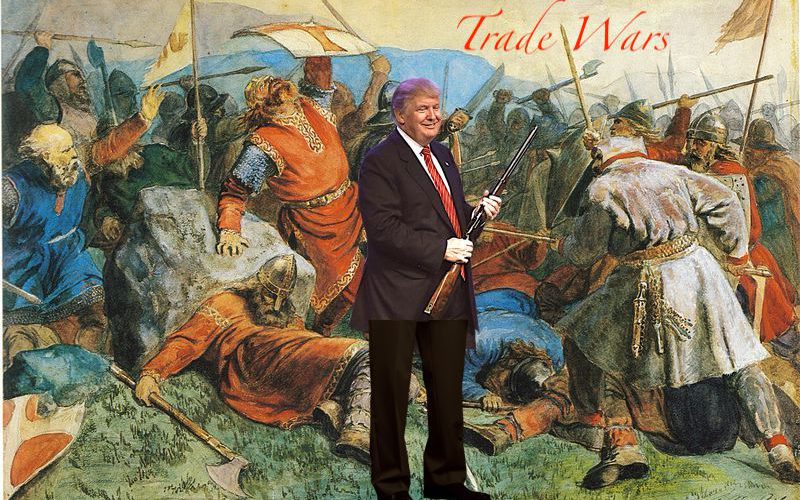The World America Abandons (Before Coming Back to Rescue It)
by D.J. McGuire
For understandable reasons, most Americans assume that Donald Trump is a one-man wrecking crew, determined either to destroy or to reshape the current global order. In reality, however, the international order that has held in place in the Atlantic for over 70 years (and in the rest of the world for roughly 30) has been fraying for some time, and Trump is himself as much a symptom as a cause. The regions of the world are turning away from each other, and American frustration has now led to its acceleration under Trump. The result will be a world of regional powers – until one of them tries to assert global dominance, forcing the United States out of its coming stupor to lead the democratic world once more.
The Fall of the Global Order
The chief goals of the “western world” from 1945 through 1990 (and the entire world since 1990) have been greater political and economic freedom, via democracy and freer trade. Even those who were most threatened by these tenets paid lip service to them for roughly a quarter century.
Events of the last decade have challenged this. The Great Recession revealed the dark side of international economic connections. The rise of a revanchist Russia has greatly damaged the democratic world’s confidence in itself. The behavior of the European Union towards Greece and Italy shattered the notion of the EU as a force for democracy and progress. The “Global War on Terror” revealed the apparent limits of American patience with extended military engagements. Xi Jinping’s increasing grip on the Chinese mainland has combined with economic instability to create a dangerous vacuum in justification for his dictatorship. Finally, the dramatic increase in continental sources of American energy has begun shifting America’s view of its interests abroad (especially in the Middle East).
As a result, “It’s a small world after all” has become more a dark warning than a cheery sentiment – and the peoples of said world are acting accordingly. Had this just been the United States experiencing this, the rest of the world would have simply reoriented the system with a new hegemon, and there are eager candidates for the role. Yet none of them are in a position to stake the claim, and they all have regional matters to address.
The Coming Regional Order
As a result, when the present global order falls – likely on a glide path, but falls nonetheless – it will likely be replaced by an unstable mix of regional powers: China, Russia, the EU, and the less engaged United States. The first two will be looking to expand their power without to contain potential dissent within. The European Union will attempt to turn its continental reach into real power via internal reform and centralization. The US will be trying to find a balance between reducing its obligations to the rest of the world and protecting its interests, which time will show to be far more global than the electorate currently realizes.
In theory, the Chinese Communist Party need not concern itself with electorates. In practice, legitimacy can arguably be more tricky for tyrannies than for democracies – which in part is why tyrannies resort to wars, mass incarcerations, huge development projects, etc. For the CCP, greater power abroad combines with stoking resentment of outsiders at home to give it enough legitimacy to stay in power (for now). So long as the US was blocking its regional objectives, the CCP had become (accidentally and ironically) the most likely power to challenge the US on a global scale. A retreating America will open up regional opportunities for the regime – especially in Southeast Asia and Taiwan (whose gutsy, independent democracy won’t survive the new order). While some of this will bring alarm to other capitals, the CCP can use their North Korean puppet regime as leverage until its usefulness expires – at which point Beijing can simply make the problem go away by annexing it.
The Vladimir Putin regime, by contrast, has a slew of international allies and interests left over from the former Soviet Union, and Putin hasn’t been shy about using them (especially in Syria). However, his fixation has largely been with his “near abroad” (i.e., the former Soviet republics), and an America willing to withdraw from the global stage would give him the free hand there he has craved. Like the CCP, Putin has relied upon anti-foreign resentment and increasing power (and, in his case, actual territory) for his regime’s legitimacy. That will likely continue, to the detriment of Ukraine, Georgia, Azerbaijan, and the Baltic states.
For the European Union, the problem is legitimacy – or lack thereof. The transition from trading association to intertwined economy was quite a success, the next step (to full-blown nation-state) has not gone nearly as well. The EU’s challenge will be sorting out what it is, and how it governs itself, so it can be strong enough to reject encroachments from outside. It will arguably be the most inward -looking regional power for some time.
That leaves the United States, which is attempting to become the second global hegemon in history to relinquish the role. The failure of the first (Great Britain in the period between World Wars) had been enough to delay this reckoning through the 1990s and 2000s, but the American people put their foot down in 2016 (whether they were “professionally guided” – to use Sir Arnold’s term – by outside forces will be discussed later). As it will be a Republican Administration beginning the withdrawal, the US is likely to settle in as a regional, hemispheric power. This can be seen from Donald Trump himself, who is loathe to criticize tyrannies in Europe and Asia but eager to criticize them in Latin America. I am also assuming this retreat in part because of the still strong isolationist tendencies within the left wing of the Democratic Party.
Flashpoints
While this regionalist order may seem stable from day-to-day, there will be problems. The Middle East, slowly losing the attention of the rest of the world due to changes in energy markets, will continue to be of interest to the three eastern hemisphere powers (i.e., all but the US), leading to conflict. The same will likely be true of Africa (which already has heavy CCP and EU involvement).
However, the most likely sources of “problems” will be American allies unwilling to accept second-tier status and the end of global democratic aspirations. At present, political power in Great Britain rests with an explosive coalition of insular and globalist voters united in anti-regionalism. Although it’s likely that the regionalist center will reassert itself, ti’s not guaranteed. Japan has a long history of hostility to China (there is no way that can be written without it being an understatement) and its leaders have used its recent conversion to democracy as a new reason for old geopolitics. Our NATO allies (especially in the Baltics) will be deeply worried about Russia expanding its regional hegemony. Finally, the Republic of India, while friendly with Russia, will hardly be willing to serve as Moscow’s vassal; they also have a long history of problems with the CCP.
Indeed, it will be the concept of self-determination in general that poses the greatest threat to this regionalist semi-dystopia, as nations around the world – many of whom freed themselves from colonialism less than a century ago – will be far less likely to accept what they will see (rightly) as imperialism under new names. So long as America is run by Republicans, the US will likely respond with cold indifference. The Democrats are another matter.
How it will end
At some point, Donald Trump will no longer be president. Indeed, a Democrat is all but certain to enter the White House either on 20 January 2029 or before then (I hope). However, given the aforementioned isolationism in the Democratic left (and the laws of political inertia), it is unlikely that a Democratic president will dramatically take aim at the new order (especially if said Democrat doesn’t get to 1600 PA Ave until 2025 or 2029). Said Democrat will, however, likely attempt to protect an old American ally or an African democracy from imperial encroachment. Moreover, time will show the American people that the stable international order currently under threat was a boon for international trade and American commerce.
That will likely lead to a global confrontation of some kind, forcing America out of its regionalist stupor as it relearns the lessons of the mid-20th century. How many casualties are involved in that confrontation, I cannot say.
How this can be reversed
There is no reason that this future is inevitable. Some might note the mere fact that I’m predicting it would make it less likely. More to the point, it can be avoided if the American people in general (and the Democratic Party in particular) recognize the damage to American interests that come with retreating from the world stage.
Ironically, that could come from the most divisive issue in current American politics: the Mueller investigation. The events that Mueller is probing (the Russian regime’s criminal interventions in America’s last presidential election) will be far more likely in this future as regional powers probe each other for weaknesses. If the Democratic Party is willing and able to make the logical connection between the events of 2016 and the rise of anti-American regional powers (and replace the president with one of their own in 2021), they can halt the erosion of American power before it can become permanent. Alliances and trade relationships could still be rebuilt in time; and Putin could be checked in Europe; and the CCP would realize that the US is not yet ready to give them free reign outside of the area under the regime’s control. Democrats have a further interest in challenging Russian revanchism, given Putin’s inspirational support to white supremacy in America.
However, if the Democrats are unwilling to do that, this future is more likely than any other.
D.J. McGuire – a self-described “progressive conservative” – has been part of the More Perfect Union Podcast since 2015







